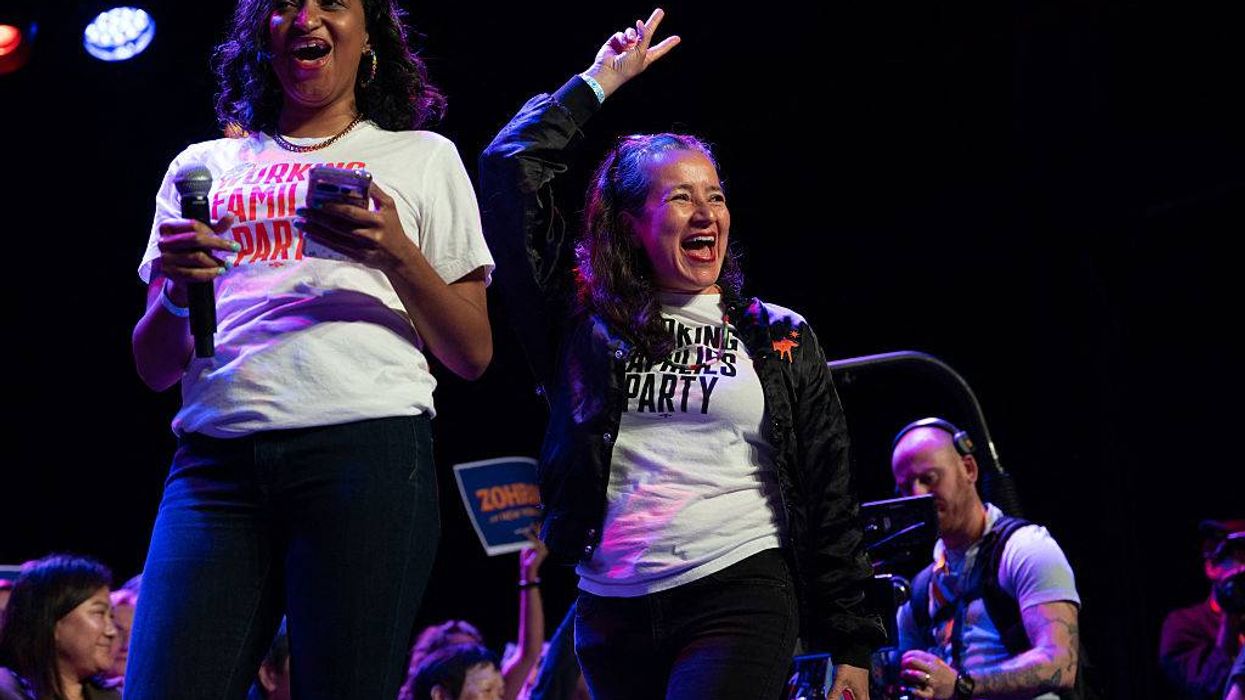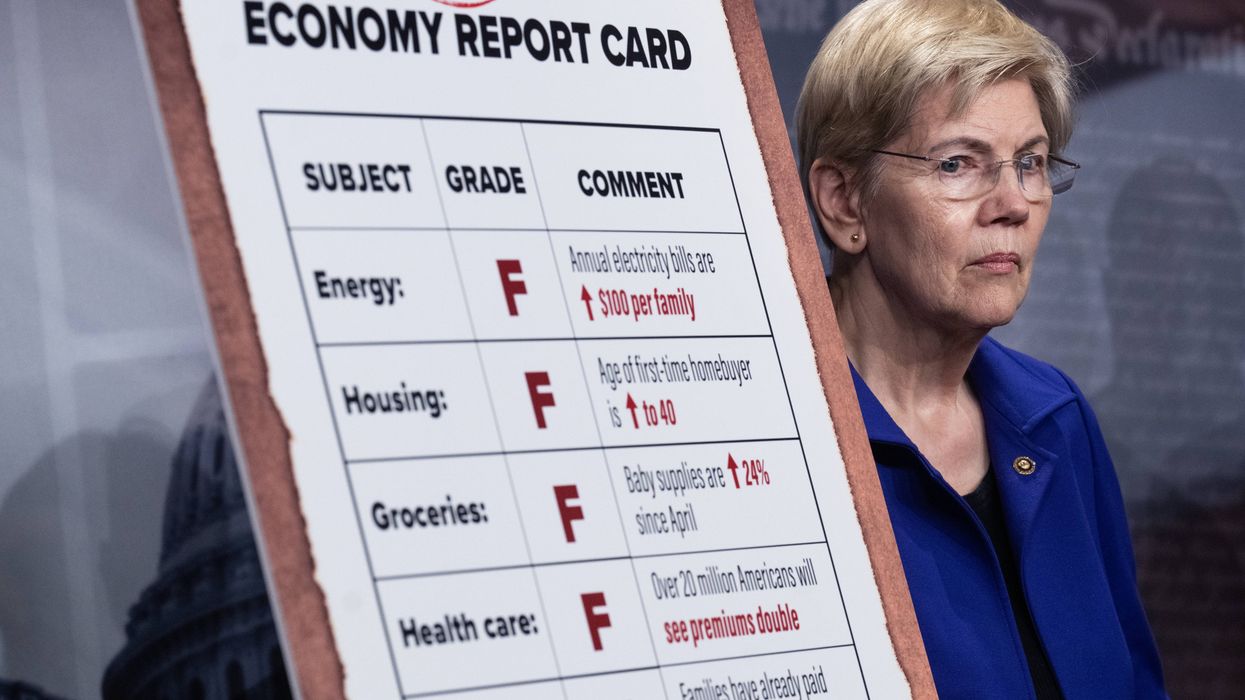October, 16 2012, 09:20am EDT

Sanders: Don't Use Social Security COLA to Cut Benefits
U.S. Sen. Bernie Sanders (I-Vt.) said today's announcement of only a 1.7 percent cost-of-living increase for 56 million Social Security recipients underscores the need to shield seniors and disabled veterans from proposals to cut benefits.
BURLINGTON, Vt.
U.S. Sen. Bernie Sanders (I-Vt.) said today's announcement of only a 1.7 percent cost-of-living increase for 56 million Social Security recipients underscores the need to shield seniors and disabled veterans from proposals to cut benefits.
"The method for calculating inflation for seniors is broken. Instead of fixing the problem, some in Washington and on Wall Street want to make a bad situation even worse by cutting benefits for senior citizens and veterans through a so-called chained CPI. It would be a shock to millions of seniors and disabled veterans to learn that some in Washington think their current COLAs are too generous," said Sanders, who founded the Defending Social Security Caucus in the Senate.
The cost-of-living adjustment, or COLA, for 2013 is one of the lowest increases since the automatic annual adjustments were adopted in 1975. (There was no increase in benefits in 2010 or 2011.)
It could get worse. Today's senior citizens and disabled veterans would see their benefits go down under a plan pushed by former Sen. Alan Simpson (R-Wyo.) and Erskine Bowles, the investment banker and former White House chief of staff. Among other draconian cuts, the Simpson-Bowles plan would change the formula for calculating inflation by shifting to a chained CPI or consumer price index.
"Let's be clear: for millions of senior citizens and disabled veterans living on fixed incomes, the chained CPI is not the minor 'tweak' that some say it is. It is a significant benefit cut that will make it harder for the elderly and veterans to make ends meet."
Under the chained CPI, the average senior who retires at age 65 would see their Social Security benefits cut by about $560 a year when they reach 75 and by about $1,000 a year once they turn 85. At the beginning of 2012, the average Social Security benefit for a retired worker was $14,760 per year.
The chained CPI would also substantially cut the VA benefits of more than 3 million veterans. The largest cuts would impact young, permanently disabled veterans who were seriously wounded in combat. According to the Social Security Administration, the chained CPI would mean that permanently disabled veterans who started receiving VA disability benefits at age 30 would see their benefits cut by more than $1,300 a year at age 45; $1,800 a year at age 55; and $2,260 a year at age 65.
"The idea of balancing the budget on the backs of some of the most vulnerable people in our country - the elderly, orphans, widows and disabled veterans - is not only morally grotesque, it is extremely bad economics," Sanders said.
The senator is backing another proposal to change the way inflation is calculated for seniors. It would likely raise benefits by taking into account the greater costs for health care and prescription drugs as well as home heating and cooling, which generally outstrip inflation for other goods and services used by the population at large.
LATEST NEWS
Working Families Party Seeks Banner Year as Trump-Led GOP Appears Poised for ‘Landslide Electoral Defeat’
"I don't think there’s been a better and more right time for a third party to emerge in this country that speaks to the interest of everyday working people," said Maurice Mitchell, national director of the Working Families Party.
Dec 29, 2025
The Working Families Party is gearing up to have a banner year in the 2026 midterms at a time when political trends show the Republican Party led by President Donald Trump heading for a major loss.
The party, which is now active in 18 states, is preparing to "ramp up its involvement in primary elections, supporting candidates that emphasize working-class politics and seek to disrupt the political status quo," according to a Monday report in the Guardian.
The Working Families Party (WFP) had a number of victories in 2025, highlighted by its election of democratic socialist Zohran Mamdani as mayor of New York City.
Maurice Mitchell, national director of the WFP, told the Guardian that he thinks now is the right time for a populist progressive insurgency given that both Democrats' and Republicans' brands are underwater with US voters.
"Less and less people are identifying as being a Democrat or Republican," he said. "I don't think there’s been a better and more right time for a third party to emerge in this country that speaks to the interest of everyday working people. I believe that our time has come."
Although the WFP has traditionally worked within the confines of Democratic Party primary politics, the party this year elected some candidates in the New Jersey General Assembly that lacked backing from state Democratic Party bigwigs.
"This is really the first time that there’s been Working Families candidates that ran outside of the Democratic Party structure, and so we’re building what that future looks like and what it means," Katie Brennan, a New Jersey assemblywoman-elect endorsed by the WFP who won without official Democratic Party backing, told the Guardian. “They've grown and have been making progress year in and year out, and this next year will be big for us. Now we’re in the statehouse, and what does that mean? I think it’ll continue to bring attention to the Working Families party."
One issue that the WFP hopes will propel its candidates to victory in 2026 is the nationwide backlash to artificial intelligence data centers.
In an announcement made earlier this month, the WFP said it is recruiting candidates to run against building AI data centers, which have been blamed for spiking utility bills and draining water resources, in their local communities.
“Billionaires are getting richer from data centers, while working people see their electricity and water bills go through the roof,” said Ravi Mangla, national press secretary for the WFP. "Fortunately, regular people are joining with their neighbors to push back against these big tech takeovers. We’re inviting local leaders who are fighting back to consider running for the seats where decisions about data centers are being made.”
Another reason the party may sense an opportunity is that the Trump-led GOP appears headed for brutal elections in 2026.
Polling expert G. Elliot Morris published an analysis on Monday showing that Trump's current net approval rating of -16 percentage points will likely translate into a "landslide electoral defeat" for Republicans next year.
Morris added that Trump's approval on the issue of inflation was "downright catastrophic," and noted that the president has been bleeding support even in states that voted for him by decisive margins last year.
"Trump’s approval rating is not just underwater because of Democratic resistance," he observed. "Lots of independents and Republicans disapprove of how he’s running the country, too. In fact, the decline from Trump’s vote margin in 2024 is steeper in redder parts of the country."
Keep ReadingShow Less
Nearly Half of Americans Say Their Financial Security Is Getting Worse Under Trump
In a recent focus group, one voter who supported the president in 2024 said Trump's recent claims that the economy is strong were "delusional."
Dec 29, 2025
New polling from The Guardian on Monday bolstered recent analyses that have shown low consumer confidence and job creation numbers and higher household costs and unemployment: Americans are struggling under President Donald Trump's economic policies, and they increasingly believe the White House—for all Trump's claims that the economy is strong—is to blame.
The poll, conducted by Harris for the news outlet between December 11 and 13, found that respondents were twice as likely to say their financial security is getting worse as they were to report an improvement.
Nearly half of those surveyed said their financial situation is worsening, and 57% said they perceived that the US is in a recession—although that would be defined by two quarters of negative growth in the US economy, which the country has not experienced at this point.
Despite that, the poll—along with recent focus groups including members of Trump's 2024 base, held by Syracuse University and reported on Monday by NBC News—illustrated how Trump's focus on imposing tariffs on countries around the world and his promotion of policies that have raised household bills for millions of people have left Americans feeling pessimistic about their own financial health and that of the country.
Democratic voters were far more likely than Republicans to tell Harris that their financial security is getting worse, with 52% of the latter saying so compared with 27% of the former.
But 54% of independent voters agreed that they are struggling more financially, despite Trump's recent claim that he would give the economy a grade of "A-plus-plus-plus-plus-plus.”
"We have seen a shift among these voters collectively, cracks in their faith, more questioning, oscillating, or outright change of heart about Trump."
Respondents from across the political spectrum were more likely than ever before to blame the White House for their financial struggles, Harris said.
More than three-quarters of Democrats blamed Trump's policies and "government management of the economy," along with 72% of independents and more than half of Republicans—55%.
Analyses this year have shown Trump's tariffs, which he claimed soon after taking office would "liberate" Americans from the national debt, are raising costs for small businesses and making it harder for them to stay afloat, and are passing on higher prices to consumers—resulting in ballooning grocery bills for millions of Americans.
Trump made lowering grocery prices a central promise of his campaign last year, along with repeatedly pledging that he was "going to get your energy prices down by 50%.”
But the president's embrace of artificial intelligence and the expansion of data centers—something he and congressional Republicans have aggressively pushed states to allow despite public disapproval—is unlikely to result in lower utility prices for households. Those costs have risen by 13% since Trump took office, with the president's cancellation of renewable energy projects to blame as well as energy-sucking data centers.
The focus groups held by Syracuse recently found that voters who supported the president last year have rapidly grown discouraged by his economic policies, including his tariffs, which one participant called "a tax on the American people."
"That’s who pays for it, so I don’t support it,” David S. of New Jersey told NBC. “The people who are buying those imports are paying the tax.”
With less than a year until voters are set to decide if Republicans should keep their majorities in the US House and Senate, fewer than half of the people surveyed in four focus groups said they believed Trump has made it a priority to fight inflation and reduce their costs. Robert L. of Virginia told Syracuse researchers that the president's recent comments painting a sunny picture of the economy were "delusional."
Another Virginia voter, Justin K., said the president has been focused on "prosecuting his political enemies" and "pardoning people" and has not "tried at all" to tackle the rising cost of living.
A number of those surveyed said they had decided to back Democratic candidates Abigail Spanberger and Mikie Sherrill in this year's gubernatorial elections in Virginia and New Jersey just a year after supporting Trump.
"Many of these voters gave President Trump a long runway well into the summer because they believed that he understands how business works better than they do and that his own fortune would eventually translate to enriching the country and their own finances," Margaret Talev, director of Syracuse University’s Institute for Democracy, Journalism, and Citizenship, told NBC on Monday.
"But as the year wore on, we have seen a shift among these voters collectively, cracks in their faith, more questioning, oscillating, or outright change of heart about Trump," Talev said. "What we almost never see is a wish for a do-over vote or a rush toward Democrats for the answer."
Keep ReadingShow Less
China Announces 'Major Military Drills' Around Taiwan in Wake of Massive US Arms Sale
The Chinese military drills appear to be "an effort to gain air and maritime superiority and cut off external military support" for Taiwan, said one expert.
Dec 29, 2025
The Chinese military on Monday announced it was conducting "major military drills" around Taiwan weeks after the US announced an $11 billion arms deal with the island nation.
As reported by CNN, China is mobilizing its army, navy, and air force units around Taiwan in a move that it says should serve as a "serious warning" to any "external" forces interfering with the island, which China has long claimed as its territory.
Taiwan's government, meanwhile, responded by accusing China of conducting a campaign of "military intimidation," while vowing to "take concrete action to defend the values of democracy and freedom."
Su Tzu-yun, a research fellow at the Institute for National Defense and Security Research in Taipei, told German broadcaster Deutsche Welle that China's military drills appear to be "an effort to gain air and maritime superiority and cut off external military support."
William Yang, a senior Northeast Asia analyst at the International Crisis Group think tank, told DW that while Chinese military exercises around Taiwan are now regular occurrences, the speed with which China ramped up its latest exercises "shows that the Chinese People's Liberation Army is becoming increasingly capable of rapidly deploying forces to combat-ready positions."
Although China did not mention the US directly when denouncing "external" powers, CNN noted that the decision to launch military drills came weeks after the US reached an $11 billion arms deal with Taiwan that included HIMARS rocket systems, anti-tank and anti-armor missiles, drones, howitzers, and military software.
China responded to this arms sale directly last week by announcing sanctions against US defense firms including Boeing, Northrop Grumman Systems Corporation, and L3Harris Maritime Services, according to the Guardian.
In announcing the sanctions against US firms, a Chinese foreign ministry spokesperson emphasized that "the Taiwan issue is the core of China's core interests and the first red line that cannot be crossed in China-US relations," while warning that "any provocative actions that cross the line on the Taiwan issue will be met with a strong response from China."
Keep ReadingShow Less
Most Popular


